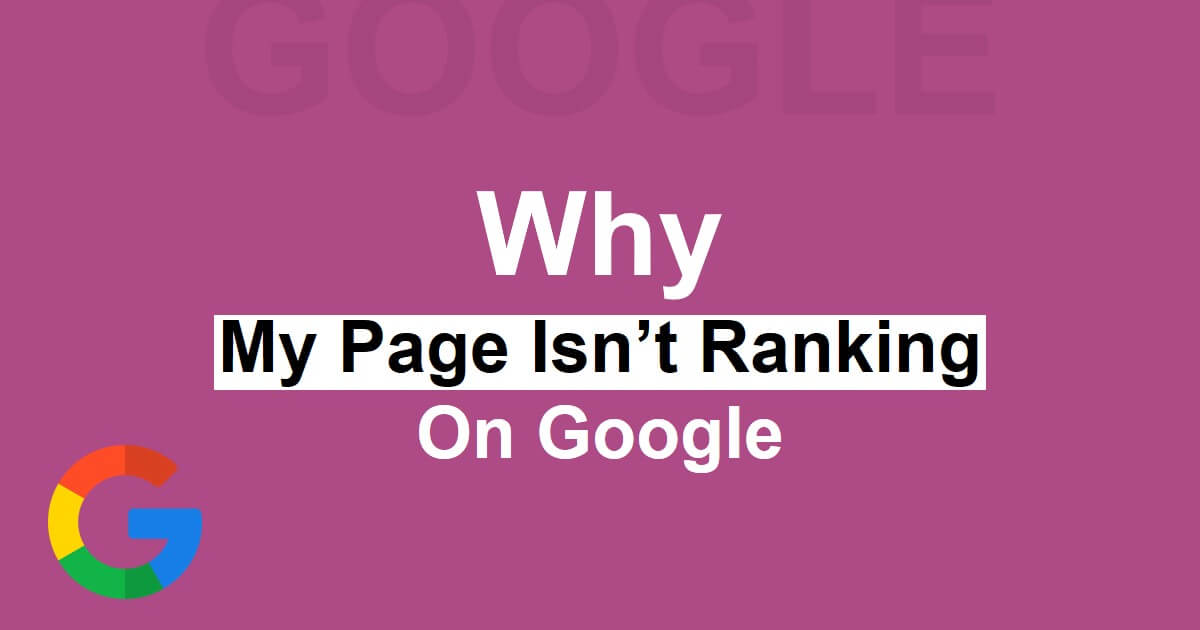
Ever felt like your website is stuck in digital limbo, invisible to the vast expanse of internet users searching for your content? You’re not alone! Many website owners find themselves scratching their heads, wondering why their meticulously crafted pages aren’t showing up on Google’s search results. Many factors contribute to a page’s ranking, and understanding them is the first step toward improvement.
- Lack of Quality Content:
In the intricate web of search engine optimization (SEO), content reigns supreme. However, not all content is created equal, and Google’s algorithms are adept at discerning between substantive, relevant content and mere fluff. To enhance your website’s visibility and appeal to both users and search engines alike, it is imperative to invest in creating high-quality, engaging content that addresses the needs and interests of your target audience.
- Poor On-Page Optimization:
On-page optimization serves as the backbone of SEO strategy, facilitating effective communication between your website and search engine crawlers. Inadequate optimization of critical elements such as title tags, meta descriptions, and headers can obstruct Google’s ability to accurately interpret and index your content. Thus, meticulous attention to detail is essential to ensure that each on-page element is meticulously optimized to align with your target keywords and convey the relevance of your content to search queries.
- Slow Page Speed:
In an era characterized by immediate gratification, the importance of page speed cannot be overstated. A slow website not only frustrates users but also incurs the wrath of search engines, which prioritize delivering swift and seamless browsing experiences. By optimizing your website’s performance through measures such as compressing images, minifying code, and leveraging browser caching, you can significantly enhance its loading speed and bolster its prospects of ascending the ranks in Google’s search results.
- Lack of Mobile-Friendliness:
With mobile devices serving as the primary gateway to the digital realm for an ever-expanding audience, ensuring the mobile-friendliness of your website is imperative. Failure to optimize your site for mobile devices not only alienates a substantial segment of potential visitors but also incurs the disfavor of Google, which prioritizes mobile-responsive websites in its search rankings. Thus, embracing responsive design principles and optimizing your site’s layout and functionality for mobile users is paramount to securing favorable placement in Google’s search results.
- Thin or Duplicate Content:
In the intricate ecosystem of online content, originality and substance are the currency of credibility. Google penalizes websites that feature thin or duplicate content, deeming such offerings unworthy of prominent placement in its search results. To safeguard your website’s standing and cultivate trust among users and search engines alike, prioritize the creation of compelling, unique content that offers genuine value and insights to your audience.
- Poor User Experience:
User experience (UX) serves as the cornerstone of online engagement, exerting a profound influence on user satisfaction and retention. A website plagued by usability issues, intrusive advertisements, or convoluted navigation schemes not only repels users but also earns the scorn of search engines. By prioritizing intuitive design, streamlined navigation, and unobtrusive advertising, you can enhance your website’s UX and curry favor with both users and search engines, thereby bolstering its prospects of securing a coveted spot on Google’s search results page.
- Lack of Backlinks:
Backlinks serve as the bedrock of authority and credibility in the realm of SEO, signifying the endorsement and validation of your website by external sources. However, securing quality backlinks from reputable domains is no mean feat and necessitates a concerted effort to cultivate relationships, foster collaborations, and create shareable content that resonates with your target audience. By prioritizing the acquisition of authoritative backlinks, you can fortify your website’s standing and amplify its visibility in Google’s search results.
- Keyword Stuffing:
Keyword stuffing, once hailed as a shortcut to SEO success, has fallen out of favor in the eyes of search engines. Excessive repetition of keywords not only compromises the readability and coherence of your content but also risks incurring penalties from Google for manipulative practices. Instead, adopt a judicious approach to keyword usage, weaving relevant terms seamlessly into your content while prioritizing natural language and user intent to optimize your website’s discoverability and relevance in search results.
- Poorly Optimized Images:
Images, while instrumental in enhancing visual appeal and engagement, can inadvertently hamper your website’s performance if not optimized effectively. Oversized images, missing alt tags, and inadequate compression can inflate page load times and detract from the overall user experience. To mitigate these issues, prioritize image optimization by resizing images, incorporating descriptive alt tags, and leveraging image compression techniques to strike a balance between visual aesthetics and optimal performance.
- Ignoring Local SEO:
For businesses with a localized customer base, neglecting local SEO is tantamount to squandering a golden opportunity for visibility and engagement. By claiming your Google My Business listing, optimizing your website for local keywords, and cultivating positive reviews and citations, you can enhance your business’s prominence in local search results and attract qualified leads from your target geographic area.
- Ignoring Technical SEO:
While the allure of content creation often steals the spotlight in SEO discourse, the foundational importance of technical SEO cannot be overstated. From addressing crawl errors and broken links to optimizing site structure and implementing schema markup, attending to technical SEO considerations is essential to ensure the accessibility, indexability, and crawlability of your website by search engines.
- Neglecting Social Signals:
While the direct impact of social signals on search rankings remains a subject of debate, their indirect influence on website visibility and authority is undeniable. By cultivating an active presence on social media platforms, fostering engagement, and encouraging social sharing and interaction, you can augment your website’s credibility and relevance in the eyes of search engines, thereby amplifying its visibility and reach in organic search results.
- Overlooking Metadata:
Metadata, comprising elements such as title tags, meta descriptions, and header tags, serves as the gateway to your website’s content for search engine crawlers and users alike. Neglecting to optimize these critical elements compromises your ability to convey the relevance and value of your content to search engines, thereby undermining your website’s visibility and click-through rates in search results.
- Lack of Fresh Content:
In the perpetual quest for relevance and resonance, the importance of fresh, regularly updated content cannot be overstated. A stagnant website devoid of new content fails to captivate and engage users, thereby diminishing its appeal to search engines. By maintaining a consistent publishing schedule, producing insightful blog posts, and updating existing content to reflect emerging trends and developments, you can cultivate a dynamic, ever-evolving web presence that garners favor with both users and search engines alike.
- Ignoring Analytics Data:
Data-driven decision-making lies at the heart of effective SEO strategy, empowering website owners to glean valuable insights, track performance metrics, and iterate on their approach accordingly. By leveraging tools such as Google Analytics and Google Search Console to monitor user behavior, track keyword performance, and identify areas for improvement, you can refine your SEO strategy, optimize your website, and enhance its visibility and relevance in search results.
- Failure to Adapt to Algorithm Updates:
In the ever-evolving landscape of search engine optimization, adaptation is the key to survival. Google’s algorithms undergo frequent updates and refinements, necessitating a nimble and proactive approach to SEO strategy. By staying abreast of algorithmic changes, industry trends, and best practices, and adjusting your SEO strategy accordingly, you can insulate your website against volatility, maintain its visibility in search results, and secure a competitive edge in the digital arena.
Bringing It All Together:
And there you have it, 16 common reasons why your website might not be ranking on Google, along with actionable solutions to help you turn things around. At i-engage, we understand the importance of a strong online presence and the impact it can have on your business’s success. By addressing these pitfalls and implementing our proven strategies, you can boost your website’s visibility, drive organic traffic, and achieve your SEO objectives. It’s a journey that requires dedication, perseverance, and the right expertise, but with our guidance and support, you can navigate the complexities of SEO and emerge victorious in the competitive landscape of online search. So, are you ready to elevate your website’s ranking and unlock its full potential? Let’s partner together and make it happen!

Comments are closed.